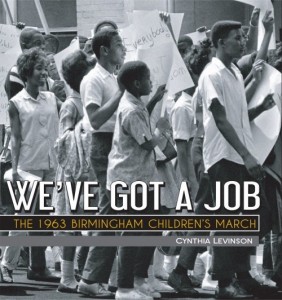“Blackbird singing in the dead of night Take these broken wings and learn to fly All your life You were only waiting for this moment to arise” -- Paul McCartney
“These are our heroes, and they still walk among us today. One of them may be sitting next to you as you read this, or standing in the next room making your dinner, or waiting for you to come outside and play.
“One of them may be you.” --Christopher Paul Curtis, afterword , THE WATSONS GO TO BIRMINGHAM, 1963
“[Fred] Shuttlesworth countered, ‘Sometimes you have to raise [your children] so they’ll be people on their own…[T]he best education was being educated to destroy the system which kept them enslaved.’ He had raised his own children this way. Six years earlier, while riding by themselves on an interstate bus from an integrated summer camp in Tennessee back to Alabama, Pat, Ricky, and Fred Jr., aged eleven through fifteen, refused to move when the driver ordered them to sit in the back of the bus. The children spent a night in the Gadsden City Jail. When their father drove to pick them up, local police ticketed him at every stop sign, even though he obeyed the traffic laws, and he lost his driver’s license for a year.”
Yes, indeedy. God shed his grace on thee and crown thy good with brotherhood. There is a heap of truly crazy, despicable stuff we learn about in WE’VE GOT A JOB. Stuff like the fact that it was actually unlawful in Birmingham back then “for a negro and a white person to play together or in company with each other” whether it was cards or checkers; baseball or basketball. Stuff like how, in the wake of a black NAACP lawyer winning a lawsuit against the University of Alabama, compelling the University to enroll a black woman they’d admitted, the state retaliated by outlawing the NAACP. Stuff like how the economic disincentives experienced by white business owners, resulting from segregation, led to a 196 referendum and subsequent election in Birmingham that actually ousted Bull Connor from elected office but that for thirty-seven days Connor refused to surrender power, continued to convene the old government in city hall, and refused to vacate the official mayor’s office.
Crazy stuff, right? But for many of the Civil Rights leaders, the notion of having children protest and get arrested so as to clog the city’s jails and other nearby jails was just as crazy. And with the Civil Rights Movement’s progress faltering in Birmingham early in 1963, there was a great debate going on about what should be done to regain momentum toward making real gains in the struggle for equal rights and equal opportunity.
“”As for white moderates who were urging delay, [Dr.] King replied, ‘I have almost reached the regrettable conclusion that the Negro’s great stumbling block in the stride toward freedom is not the…Ku Klux Klanner, but the white moderate who…feels that he can set the time-table for another man’s freedom. ‘
“Movement leaders were impatient men willing to confront both fearful blacks and obstinate whites because they knew that, as King stated, ‘”wait” has almost always meant “never.”’ At a mass meeting, he contended, ‘The time is always right to do right.’” But was it time to advocate having children protest and get thrown in jail? Amidst all the crazy stuff going on, the Reverend Dr. King suggested holding mass meetings every night…a strategy that would soon lead – despite Dr. King’s initial misgivings -- to young people answering the call to make a change by putting their young bodies on the line.
“A mass meeting rolled worship services, social visits, teen hangouts, choir concerts, sing-alongs, fish fries, strategy sessions, political debates, news reports, educational assemblies, fundraisers, crowd-rousers, and calls for volunteers all into one spiritual and spirited extravaganza. Teenage activist Gwendolyn Sanders said, ‘A typical mass meeting [was] shouting, singing, having a hallelujah time. Meeting, greeting, loving, caring, and sharing.’ These magnetic gatherings quickly became a vital feature of the civil rights movement.”
And so it is that WE’VE GOT A JOB includes the narratives of four young people from Birmingham Alabama – Audrey Hendricks, Wash Booker, Arnetta Streeter, and James Stewart -- who attended those meetings and became inspired to participate in the events in Birmingham in order to change theirs and everyone’s world for the better.
“After the mass meeting, I told my mother, ‘I want to go to jail…’” --Audrey Hendricks, age 9 “Talking ‘bout my generation” --Pete Townsend Nine years old! That made Audrey Hendricks just a year older than I was that spring! I had no idea that nine year-old American kids went to jail in the sixties to change the world.
“Each group emerged singing and clapping. Audrey’s group sang ‘Aint’ Gonna Let Nobody Turn Me ‘Round.’ She later exclaimed, ‘The singing was like a jubilance.’ Her group didn’t march as far as James’s had. ‘We got across the street, to the middle of the next block.’ As her parents watched, she was arrested and put in the paddy wagon. Holding her game tightly, she was driven to Juvenile Hall at City Jail.
“Each time the last marcher in a group [of fifty] was loaded into a paddy wagon, the police assumed the parade was over. Just that morning, Connor had assured his men that King would quickly ‘run out of niggers.’ But, then, the church doors would open again, and more kids would burst out. One officer finally asked Shuttlesworth, ‘How many more have you got?’”
Witnessing what happened the second day of the Children’s March – the high-pressure fire hoses and biting police dogs turned on young people, footage of which was broadcast nationally on the nightly news – affected me, then a very sensitive eight year-old, to the extent that this story is part of my own story. Through my forever-after identifying with those children and teens on the evening news, these events changed me. And it changed history. The fallout resulting from the nation’s seeing these children arrested and abused reenergized the Civil Rights Movement, galvanized national support for change, and compelled President Kennedy to move forward on civil and voting rights issues. By the fifth day of the action, nearly 10,000 people packed four mass meetings in Birmingham at which Dr. King spoke. As a result of these children acting, Birmingham’s power structure and white business community were forced, albeit reluctantly, to change its ways.
Sadly, it also led to racist revenge, culminating with the September 15, 1963 Ku Klux Klan bombing of the Sixteenth Street Baptist Church that killed four children. I’VE GOT A JOB is going to make a stellar nonfiction companion to Christopher Paul Curtis’s THE WATSONS GO TO BIRMINGHAM, 1963 and Carole Boston Weatherford’s BIRMINGHAM, 1963.
In a final chapter, we learn what became of these four young people who we’ve followed through months in 1963 Birmingham. It is really exciting to learn each of their success stories. I’VE GOT A JOB is a powerful account of those history-changing days that are now a half-century in the past but not at all forgotten. Through text and photographs, this is a testimony that will stun and inspire young people born decades afterward in the same way that it still stuns and inspires me as one who remembers it all too well. 176 pages
“From sea to shining sea.” Recommended by Richie Partington, MLIS, Librarian, California, USA Visit his blog at: Richie's Picks _https://richiespicks.co






